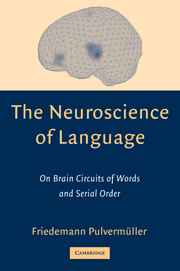Book contents
- Frontmatter
- Contents
- Preface
- The Neuroscience of Language
- 1 A Guide to the Book
- 2 Neuronal Structure and Function
- 3 From Classic Aphasia Research to Modern Neuroimaging
- 4 Words in the Brain
- Excursus E1 Explaining Neuropsychological Double Dissociations
- 5 Regulation, Overlap, and Web Tails
- 6 Neural Algorithms and Neural Networks
- 7 Basic Syntax
- 8 Synfire Chains as the Basis of Serial Order in the Brain
- 9 Sequence Detectors
- 10 Neuronal Grammar
- 11 Neuronal Grammar and Algorithms
- Excursus E2 Basic Bits of Neuronal Grammar
- Excursus E3 A Web Response to a Sentence
- 12 Refining Neuronal Grammar
- Excursus E4 Multiple Reverberation for Resolving Lexical Ambiguity
- Excursus E5 Multiple Reverberations and Multiple Center Embeddings
- 13 Neurophysiology of Syntax
- 14 Linguistics and the Brain
- References
- Abbreviations
- Author Index
- Subject Index
14 - Linguistics and the Brain
Published online by Cambridge University Press: 15 December 2009
- Frontmatter
- Contents
- Preface
- The Neuroscience of Language
- 1 A Guide to the Book
- 2 Neuronal Structure and Function
- 3 From Classic Aphasia Research to Modern Neuroimaging
- 4 Words in the Brain
- Excursus E1 Explaining Neuropsychological Double Dissociations
- 5 Regulation, Overlap, and Web Tails
- 6 Neural Algorithms and Neural Networks
- 7 Basic Syntax
- 8 Synfire Chains as the Basis of Serial Order in the Brain
- 9 Sequence Detectors
- 10 Neuronal Grammar
- 11 Neuronal Grammar and Algorithms
- Excursus E2 Basic Bits of Neuronal Grammar
- Excursus E3 A Web Response to a Sentence
- 12 Refining Neuronal Grammar
- Excursus E4 Multiple Reverberation for Resolving Lexical Ambiguity
- Excursus E5 Multiple Reverberations and Multiple Center Embeddings
- 13 Neurophysiology of Syntax
- 14 Linguistics and the Brain
- References
- Abbreviations
- Author Index
- Subject Index
Summary
Linguistics is the study of language. Language is a system of brain circuits. To qualify the latter statement, one may cite the father of modern linguistics, Ferdinand de Saussure, who claimed that language (i.e., the language system, or langue) is a “concrete natural object seated in the brain” (de Saussure, 1916). If linguistics is the study of language and language is in one sense a system of brain circuits, one would expect linguists to be open to the study of brain circuits. However, the dominating view in linguistics appears to be that language theories must be formulated in an abstract manner, not in terms of neuron circuits. Section 14.1 asks why linguists favor abstract rather than neuron-based formulations of language mechanisms. Section 14.2 discusses a few thoughts about how an abstract theory of language may profit from a brain basis.
Why Are Linguistic Theories Abstract?
As mentioned, the dominating view in linguistics is that language theories must be formulated in an abstract way. This could be a trivial claim because it is clear that every scientific theory must include abstract concepts. However, this is not the point. The point is that abstract in this context excludes explicit reference to the organic basis of the processes described in an abstract fashion. Linguistic theory is abstract in the sense that it does not refer to neurons. Why is this so?
Information
- Type
- Chapter
- Information
- The Neuroscience of LanguageOn Brain Circuits of Words and Serial Order, pp. 270 - 276Publisher: Cambridge University PressPrint publication year: 2003
